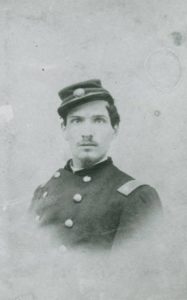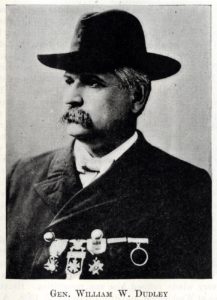General Dudley and his ‘blocks of five’
21 April 2019
Captain William W. Dudley turned 20 years old about two weeks before the great and terrible battle of Antietam. He took command of the 19th Indiana Infantry there on the morning of 17 September 1862 after its commander Lieutenant Colonel Alois Bachman was mortally wounded leading their charge across the Hagerstown Pike. [His after-action report is on AotW]
By the end of October 1862 Dudley was Lieutenant Colonel of the Regiment. Quite an achievement for one so young, but by no means the end of his story.
He briefly commanded the regiment again at Gettysburg on 1 July 1863 after Colonel Samuel J. Williams was wounded, but was himself shot in the right leg and captured by the enemy. Released on 4 July, he later lost his leg to amputation. After a lengthy convalescence he was discharged for disability in June 1864.
He returned to service as Captain in the Veteran Reserve Corps in March 1865 and served in staff positions. He was honored by brevets to Major, Lieutenant Colonel (for his war service), Colonel and Brigadier General (for gallantry at Gettysburg) in March 1865 and left the army for the last time on 30 June 1866.
A very impressive record
But what he was best known for, at least among his peers, was a political scandal of his own making.
General Dudley was very active in Indiana and national Republican politics after the War – a faithful organizer and fundraiser for 20 years – and by 1888 was Treasurer of the Republican National Committee. In that role, during the Cleveland-Harrison presidential race, he wrote a letter to his operatives in Indiana advising them how to manage their “floaters” – voters willing to take money to vote the party ticket – recommending organizing them in groups or “blocks” of five people, closely supervised by a trusted party worker.
An enterprising Democrat in the post office opened the letter and sent it to friendly newspapers.
Although the practice of paying for “undecided” votes was common in both parties, the public release of the now infamous “blocks of five” letter was an embarrassment to the Republicans and their candidate Indiana Senator Benjamin Harrison in particular.
In November 1888 Harrison very narrowly won in Indiana and lost the national popular vote, but squeaked out a victory in the Electoral College to unseat the incumbent Democrat Grover Cleveland.
Dudley never got an invitation to the Harrison White House, needless to say. He maintained an address in his hometown of Richmond, Indiana, but never lived there there again.
Forced out of his beloved politics, he spent his remaining twenty years in law practice in Washington, DC. He died there in 1909 and is buried in Arlington National Cemetery.



Please Leave a Reply